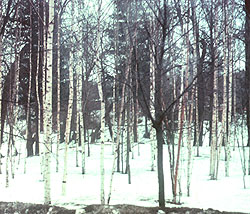
Whenever I think about studying Russian history I remember a number of different Russian cultural "moments";
- the passage in Lev Tolstoi's War and Peace with Prince Andrei lying wounded and left for dead on the battlefield of Austerlitz, staring up into the deep, blue sky
- or the final scene of Sergei's Prokofiev's tragic ballet Romeo and Juliet when the two lovers die inches from each others grasp
- or the unbelievable sorrows of Natalia depicted in Mikhail Sholokhov's Quiet Flows the Don
- or the oil field worker reflecting on his life just before he is about to die while saving a trapped friend, when he recalls that no one ever needed him except his country (Siberiada).
It is only a bit curious that there are so many death images represented here!
Despite protestations to the contrary, Russia has always seemed to me to imply tragedy, immense personal loss, a sense of what might have been, suffering on a grand scale. Yes, death also comes to mind. Consider just the tens of millions who perished in World War II. Yet all of that tragedy has always been coupled with a deep Russian awareness of the spiritual, the "Russian soul" and a quest to establish moral worth (I am rethinking that).
I've been studying Russian history for a lot of years. Initially I knew of Russia from my family, as my grandparents emigrated to the US from a small village midway between Minsk and Vilna before World War I. Eventually, I learned more about Russia from my reading of military history and the various war games that I played as a kid. I studied Russian history as an undergraduate, and I began to read a lot of Russian literature, starting with War and Peace. I continued my graduate studies at the University of Virginia, where I finally finished my Ph.d. in Russian history, focusing on the nineteenth century. (If you dare, you can read portions of my dissertation.) I continued to read as much about Russia as I could, watched movies, listened to music, visited there a bit; I don't necessarily follow the news about Russia closely anymore as the situation there is not very good (more about that in HIS 242).
You know, I have a saying, "Once you have read War and Peace for the third time, and after you have finished reading Mikhail Bulgakov's Master and Margarita for the tenth or twelfth time, then you will begin to appreciate the history that is Russia."
- Check some web (and some book) selected resources, such as maps and reference works, that we recommend to anyone interested in Russian history and culture.
- George Mitrevski, Auburn University, has some instructional materials for learning Russian. There is available a site to learn Russian online. If you are a bit more advanced, you can try the Russian Language mentor. If you just want to learn the alphabet, try a Russian Alphabet tutorial.
- To follow current events in Russia, check: The St. Petersburg Times, Nezavisimaia Gazeta (in Russian) or Pravda.
- For Russian cooking, check: the Russian Cookbook, Russian Cooking (in Russian) or Russian Foods.com.
- James Billington's The Face of Russia, a PBS series